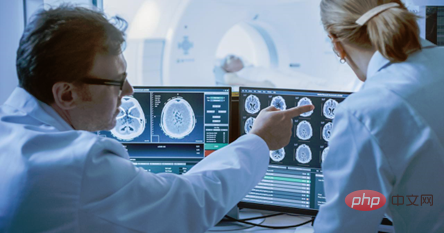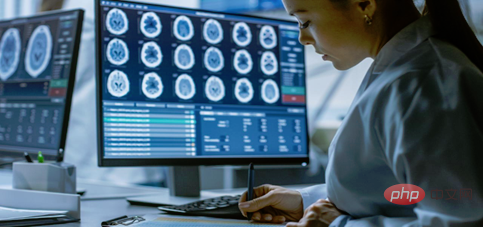Home >Technology peripherals >AI >Build an AI medical imaging ecosystem NVIDIA MONAI accelerates the implementation of medical artificial intelligence
Build an AI medical imaging ecosystem NVIDIA MONAI accelerates the implementation of medical artificial intelligence
- 王林forward
- 2023-04-12 16:19:111077browse
In recent years, medical artificial intelligence has ushered in rapid development, and subdivided scenarios such as imaging AI, new drug research and development AI, robot AI, and smart hospitals have continued to emerge. AI-accelerated medical services can advance everything from human physiology to all diseases to even hospital operations.
At the RSNA conference, NVIDIA shared its practices in helping to build an AI medical imaging ecosystem. Among them, MONAI is an open source medical imaging AI framework accelerated by NVIDIA technology, and its downloads have exceeded 650,000 times. With the MONAI Application Package (MAP), MONAI can more easily integrate models into clinical workflows.
Deploy medical imaging AI to MAP
Currently, if a hospital wants to deploy several AI models in the imaging department to help experts identify more than a dozen different conditions or Semi-automated creation of medical imaging reports requires considerable time and resources to find the appropriate hardware and software infrastructure for each model.

MAP is provided through MONAI Deploy as a packaging method of AI models that can be deployed more easily in the existing medical ecosystem.
MAP specifications are developed by the MONAI Deploy working group. The working group, composed of experts from more than a dozen medical imaging institutions, aims to support AI application developers as well as clinical and infrastructure platforms that run AI applications.
If developers use the MONAI Deploy application software development kit to package an application, hospitals can easily run the application locally or in the cloud. The MAP specification also integrates medical IT standards, such as the medical imaging interoperability standard DICOM.
For developers, MAP can help researchers easily package and test models in clinical environments, thereby accelerating the evolution of AI models. This allows them to collect real-world feedback to refine and improve the AI.
For cloud service providers, support for MAP (designed using cloud native technology) can help researchers and enterprises using MONAI Deploy run AI applications on their own platforms through container or native application integration. . Cloud platforms that integrate MONAI Deploy and MAP include:
Amazon HealthLake Imaging: The MAP interface has been integrated into the HealthLake imaging service, allowing clinicians to view, process and segment medical images in real time.
Google Cloud: Google Cloud’s medical imaging suite makes medical imaging data more accessible, more interoperable, and more useful. The suite has integrated MONAI into its platform, enabling clinicians to deploy AI-assisted annotation tools to help automate manual and repetitive medical image labeling tasks.
Nuance Precision Imaging Network powered by Microsoft Azure: Nuance and NVIDIA recently announced a collaboration to combine MONAI with the Nuance Precision Imaging Network. Nuance Precision Imaging Network is a cloud platform that provides AI tools and insights to more than 12,000 medical institutions.
Oracle Cloud Infrastructure: Oracle and NVIDIA recently announced a collaboration to bring accelerated computing solutions for the healthcare industry, including MONAI Deploy, to Oracle Cloud Infrastructure. Starting today, developers can use NVIDIA containers on Oracle Cloud Marketplace to build MAP through MONAI Deploy.
MONAI Deploy is adopted by hospitals and healthcare startups
Healthcare institutions, academic medical centers and AI software developers around the world are adopting MONAI Deploy, including:
Cincinnati Children's Hospital: The academic medical center is creating MAP for an AI model that can automatically segment whole heart volumes in CT images, through a project funded by the National Institutes of Health. Provide assistance to pediatric heart transplant patients.
UK National Health Service (NHS): NHS Trust Fund has deployed the MONAI-based AI deployment engine platform - AIDE (AI Deployment Engine) in four hospitals, dedicated to Professional medical staff provide AI disease detection tools. These medical staff serve 5 million patients annually.
AIDE’s full name is AI Deployment Engine, which is “AI Deployment Engine”. It is expected to be rolled out to 11 NHS hospitals next year, and will provide services to 18 million patients and provide AI capabilities to clinicians. AIDE is built on MONAI. MONAI is an open source medical imaging AI framework jointly developed by NVIDIA and AI Centre, which can be used to connect AI applications and hospital systems.

Through the combination of MONAI and AIDE, medical imaging AI models can be safely and effectively verified, deployed, and evaluated. These models will be used by the NHS to diagnose and treat diseases such as cancer, stroke, and dementia. The platform is currently being deployed at Guy's and St Thomas' Hospital, King's College Hospital, University of East Kent Hospitals and University College London Hospitals NHS Foundation Trust.
Qure.ai: NVIDIA Startup Accelerator Program member Qure.ai develops medical imaging AI models for use cases such as lung cancer, brain trauma, and tuberculosis. The company is using MAP to package solutions for deployment and drive these solutions to clinical impact more quickly.
SimBioSys: The Chicago-based NVIDIA Startup Acceleration Program member builds 3D virtual representations of patients’ tumors and uses MAP to help predict how patients will respond to specific treatments. Precision medical AI applications.
UC San Francisco: UCSF is developing MAP for several AI models, including applications such as hip fracture detection, liver and brain tumor segmentation, and knee and breast cancer classification. .
Conclusion
Launched in 2019, MONAI reduces the complexity of the medical workflow from R&D to clinical practice. With MONAI, developers can easily build and deploy AI applications, create models that can be used for clinical integration, and more easily interpret medical examination results to gain a deeper understanding of patient conditions.
With the popularization of AI technology in the medical industry, MONAI provides deep learning infrastructure and workflows optimized for medical imaging, which can give full play to the role and potential of medical imaging data and simplify the construction process of AI models. .
The above is the detailed content of Build an AI medical imaging ecosystem NVIDIA MONAI accelerates the implementation of medical artificial intelligence. For more information, please follow other related articles on the PHP Chinese website!
Related articles
See more- Technology trends to watch in 2023
- How Artificial Intelligence is Bringing New Everyday Work to Data Center Teams
- Can artificial intelligence or automation solve the problem of low energy efficiency in buildings?
- OpenAI co-founder interviewed by Huang Renxun: GPT-4's reasoning capabilities have not yet reached expectations
- Microsoft's Bing surpasses Google in search traffic thanks to OpenAI technology

